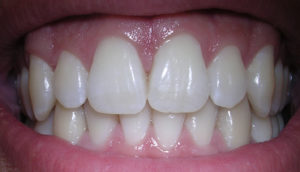 The finding that the oral bacteria Streptococcus mutans, which is found in 10% of the population, is linked with hemorrhagic strokes is big. S. mutans is found in tooth decay or cavities (dental caries). The researchers found a link with cnm-positive S. mutans with both intracerebral hemorrhage (ICH) and also with cerebral microbleeds.
The finding that the oral bacteria Streptococcus mutans, which is found in 10% of the population, is linked with hemorrhagic strokes is big. S. mutans is found in tooth decay or cavities (dental caries). The researchers found a link with cnm-positive S. mutans with both intracerebral hemorrhage (ICH) and also with cerebral microbleeds.
Some risk factors for strokes have long since been known, such as high blood pressure and advanced age, but then there are those hemorrhagic strikes that don't seem to fit the norm, with no apparent risk factors. Well, apparently the presence of cnm-positive S. mutans is one. My understanding of what cnm-positive S. mutans means is S. mutans bacteria that carries the collagen-binding Cnm gene. This bacteria can be found in a person's saliva and in dental plaque, and swabs of both were taken for this study.
This study builds on other studies that find a link between the bacteria Streptococcus mutans and a number of systemic diseases, including bacteremia, infective endocarditis and hemorrhagic stroke. The researchers of this latest study suggest that infection with cnm-positive S. mutans causes constant inflammation (as shown by 2 inflammatory markers: CRP and fibrinogen), which then causes damage to blood vessels (endothelial damage) in the brain. Bottom line: take care of your teeth and gums.
From Science Daily: Oral bacteria linked to risk of stroke
In a study of patients entering the hospital for acute stroke, researchers have increased their understanding of an association between certain types of stroke and the presence of the oral bacteria (cnm-positive Streptococcus mutans).
In the single hospital study, researchers at the National Cerebral and Cardiovascular Center in Osaka, Japan, observed stroke patients to gain a better understanding of the relationship between hemorrhagic stroke and oral bacteria. Among the patients who experienced intracerebral hemorrhage (ICH), 26 percent were found to have a specific bacterium in their saliva, cnm-positive S. mutans. Among patients with other types of stroke, only 6 percent tested positive for the bacterium.
Strokes are characterized as either ischemic strokes, which involve a blockage of one or more blood vessels supplying the brain, or hemorrhagic strokes, in which blood vessels in the brain rupture, causing bleeding.
The researchers also evaluated MRIs of study subjects for the presence of cerebral microbleeds (CMB), small brain hemorrhages which may cause dementia and also often underlie ICH. They found that the number of CMBs was significantly higher in subjects with cnm-positive S. mutans than in those without. The authors hypothesize that the S. mutans bacteria may bind to blood vessels weakened by age and high blood pressure, causing arterial ruptures in the brain, leading to small or large hemorrhages.
"This study shows that oral health is important for brain health. People need to take care of their teeth because it is good for their brain and their heart as well as their teeth," Friedland said. "The study and related work in our labs have shown that oral bacteria are involved in several kinds of stroke, including brain hemorrhages and strokes that lead to dementia."
Multiple research studies have shown a close association between the presence of gum disease and heart disease, and a 2013 publication by Jan Potempa, Ph.D., D.Sc., of the UofL School of Dentistry, revealed how the bacterium responsible for gum disease worsens rheumatoid arthritis. The cnm-negative S. mutans bacteria is found in approximately 10 percent of the general population, Friedland says, and is known to cause dental cavities (tooth decay). Friedland also is researching the role of oral bacteria in other diseases affecting the brain. http://www.nature.com/articles/srep20074
